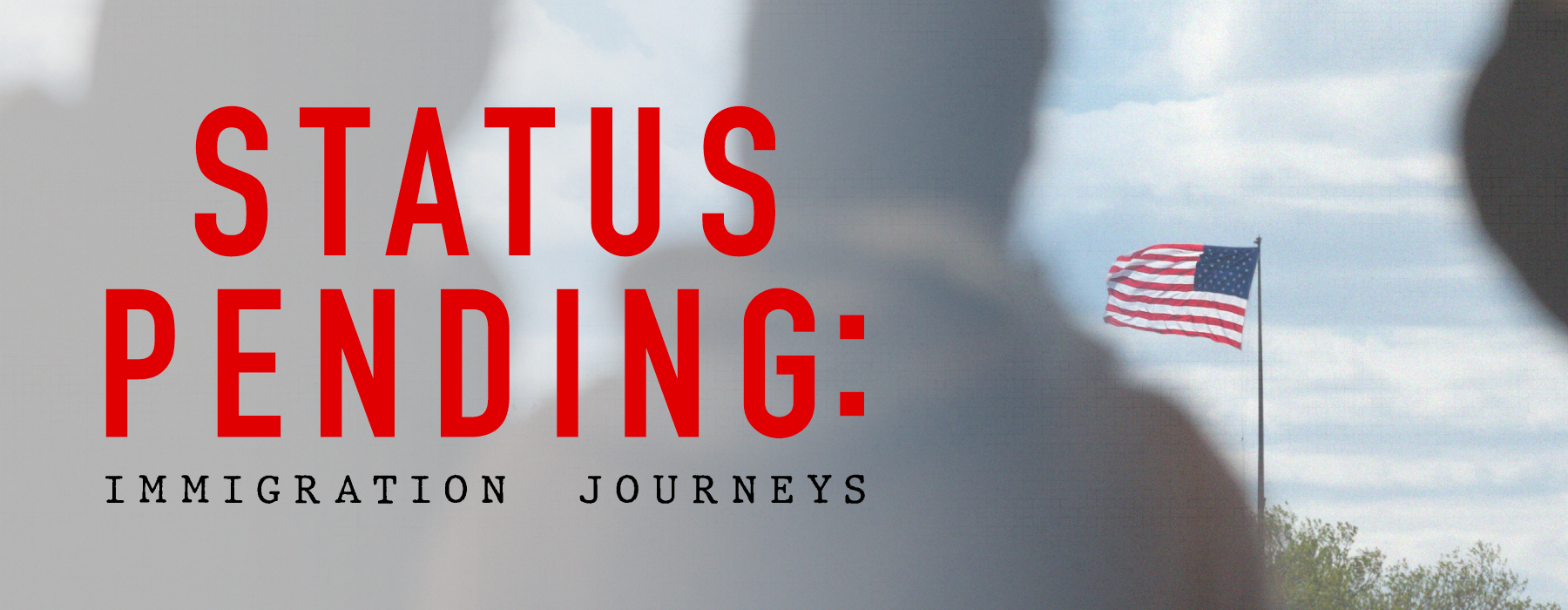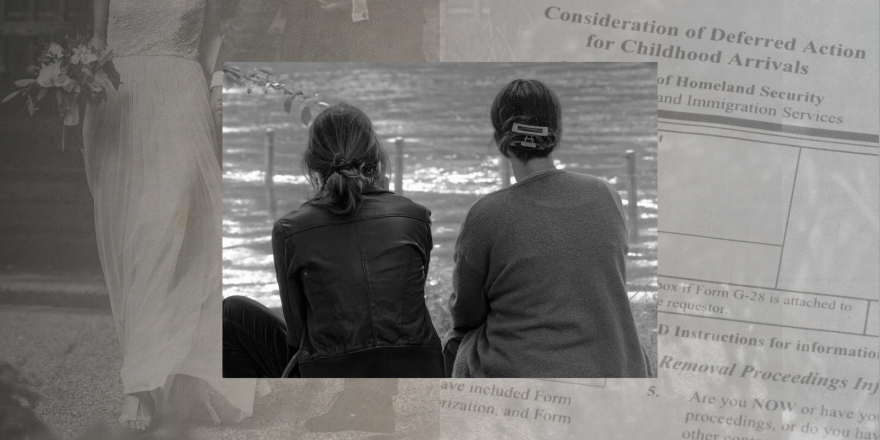You know when you’re waiting for some important news — a test result, or a job application — and then the call comes at the most unexpected time?
That’s what happened to A. She was at the vet, with her cat.
"And I pulled out my phone to start taking notes for what the vet was telling me, when I saw the Gmail notification that USCIS had taken action on my case," A says.
USCIS is U.S. Citizenship and Immigration Services. A had lived in the U.S. without permanent legal status since she was two.
Earlier this year, she applied for her green card after marrying her husband, a U.S. citizen. The email she got at the vet’s office was everything she was hoping for.
"I just, like, gasped and [the vet's] like, 'What’s wrong?' And I told her, 'This might be TMI but I applied for my green card, and I think they just approved it.'"
A says so much was going on in her head reading this news: relief, excitement and exhaustion.
"That lack of autonomy has been really hard throughout my entire life, with such a lack of ability to make my own decisions — it just really ticks me off," A says. "I feel so many things and nothing at the same time. Because it’s so hard, I think, to process years of built up emotion. Like I want to cry and I don’t know what it is."
On Status Pending, a podcast from WUWM, we’ll look at how our immigration system works — and doesn't. And the impact it has on the people who are going through it.
A is 27 years old and lives in Milwaukee, Wisconsin. We’re not using her name, because even with the green card approval, her immigration status still leaves her vulnerable.
Chapter 1: Undocumented
A’s family is originally from León, Guanajuato, Mexico. The journey here started with her dad. He struggled to financially support his family, so in 1998, he came to the U.S. to work. A says he left Mexico without telling his wife.
"And then once he made it across the border and got to Wisconsin, he called her and said, 'Hey, I’m in the U.S. I’m not coming back, at least for a good while. I’m going to start sending you money.'"
Two years later, A's mom followed her husband. A smuggler helped her cross the border. In all, it was a group of five people: A's mom; her three young daughters, who were two, four, and seven; and A’s aunt, who was only 18 years old and six months pregnant.
"My mom is a very strong person. She prides herself in not crying. So she tells the story nonchalantly, and I don’t think it’s so nonchalant," says A. "I think her way of storytelling is really informed by wanting to protect our feelings. And I think over the time she’s just been really desensitized to it."
A, her mom and sisters reunited with her dad in Milwaukee, and that’s where they’ve been ever since.
Growing up, A knew that she and her family were undocumented.
"I think when I was really young, I had this idea that I would never drive, and I would never have a real job. My life was gonna be just like my mom’s," she says.
But when A was a teenager, everything changed.
Chapter 2: DACAmented
"When DACA came out, it was like this golden ticket," A remembers.
DACA is Deferred Action for Childhood Arrivals. It's an Obama-era policy that allowed immigrants who were brought to the U.S. as children to apply for a sort of temporary permission to live and work here. It gave young immigrants, like A, a chance at some normalcy.
"So once I turned 16 and was of legal working age, I threw a fit and was like, 'I really need my work authorization. I need a driver's license,'" A says. "I’m the youngest, and I was the first of my sisters to get a driver's license. I mean, I think I really put my parents through hell, because I would, like, throw real fits and I just wanted my way."
That is one example of A’s persistence. Even though she’s the youngest child, she’s been a leader helping her family navigate the immigration system.
"When DACA came out, it was like this golden ticket." - A
"My sister A is a very strong woman that does not take no for an answer," says A's older sister. She’s 29, the middle child out of the three. We’re calling her S, because her immigration status also leaves her vulnerable.
Between the two sisters, A is more outspoken, S is more reserved. A is a big thrifter. She likes restoring vintage purses and shoes. She’s also really into photography. S channels her energy, and her stress, into exercise, like hiking and weightlifting.
"I would describe myself as a very happy but anxious person," S says. "And I bring up the word anxious to describe myself because I do think my status has a lot to do with it. I’m always on edge regarding my status and potentially being deported, or somebody in my family being deported."
The sisters were able to lean on each other as they went through the next step in their immigration journey together: applying for green cards.
Chapter 3: Green card applications
Both A and S married U.S. citizens around the same time — just months apart from each other in 2024. A didn’t expect their timelines to line up like that.
"My sister was in her relationship a lot longer than I was, but she was younger when she met her now husband," A says. "So I think it was more of a youthful relationship for a long time until they were ready for that conversation of marriage. And I met my now husband a little bit later in my life where I was ready to settle down and get married."
Getting married and planning a wedding — it's already life-changing and stressful enough. But on top of that, the sisters’ immigration status loomed over them. Both couples’ wedding plans were affected by it, but in different ways.
A says her dream wedding would have been in Vegas, with an Elvis impersonator involved. But she and her fiancé decided against that because of the cost. They had done the math and learned that the green card process costs thousands of dollars.
"So, we decided to elope," says A. "And we were supposed to elope in Door County on Valentine’s Day, but when Trump won the 2024 election, [my fiancé] was really panicked. And we wanted to submit my application for a green card before [Trump] took office, so we got married in December a couple months before. And [my husband's] wedding band still has Feb. 14 engraved on it, we still haven’t fixed it."
"We were both really motivated by this really common perception that any green card application will take years and years to be processed." - A
While A’s dream wedding would have included an Elvis impersonator, S was more traditional: she wanted a big Catholic wedding. But in order to make it official more quickly, she and her husband got married in a small civil ceremony first, in March of 2024. They planned to do the big, Catholic ceremony farther down the road.
"Like my sister mentioned, her husband was worried about her legal status, and so was mine. So that was our priority," says S. "So we knew we couldn’t do both at the same time, to have our religious and civil ceremony together, so that was the solution we decided on."
Both couples were worried about Trump, and they expected the green card process to take a long time.
"We were both really motivated by this really common perception that any green card application will take years and years to be processed," says A. "We were in the mindset of let’s get in line, let’s get the applications submitted and then we can forget about them for years and years and years and they’ll call us back, and we’ll keep living our lives in the meantime."
The U.S. grants about one million green cards to immigrants each year. Green card holders are permanent legal residents, one step away from U.S. citizenship.
Close to half of green cards go to spouses, children and parents of U.S. citizens — they are considered "immediate relatives." Unlike other visa categories, there is no limit on the number of green cards for immediate relatives of U.S. citizens.
A and S got married to U.S. citizens in 2024, but that doesn’t mean they automatically got green cards. What comes next is an expensive, complex application process.
And even now, the sisters approached things differently. S, the older sister, hired a lawyer.
"There’s a lot of ways your case can be dismissed for just a minimal error, and I just didn’t want to test my luck," S says.
A, the younger sister, decided to do it herself. She closely read every government document to see what she would need to make the strongest case. She gathered birth certificates, financial statements, tax returns, DACA authorizations, statements from her and her husband’s shared bank account, shared bills.
"I know that my marriage is honest and true, and I worry that because of whatever documents I can provide, that it won’t be apparent." - A
She also gathered proof to show that her relationship with her husband is authentic. For that, she had pictures going back years.
"You know, I know that my marriage is honest and true, and I worry that because of whatever documents I can provide, that it isn’t or won’t be apparent, or that the person reviewing, because of their preconceived notions, they’ll think that I’m lying — I think that’s really anxiety-inducing," A says.
Each couple filled out an application called the I-130 — it involves the U.S. citizen petitioning for their relative to become a permanent resident. The sisters submitted another application alongside it, an I–485, seeking to adjust their status from DACA recipients to permanent residents.
Both couples submitted these documents in January 2025, about two weeks apart.
In May, both of them received notice that they would move on to the next step — an interview with USCIS in Milwaukee. The appointment for S was in late June, A’s appointment was in early July.
When S and her husband showed up for their interview, they got even more anxious, because their lawyer wasn't there. He was running late. They decided to do it without him, because they didn’t want to reschedule the appointment.
The days after their green card interviews were nerve-wracking for the sisters. They looked to Facebook groups with people going through similar experiences to compare whether it was normal to not hear back right away.
"I wish I would’ve just gotten an answer today," S said in a voice memo she recorded after her USCIS interview. "I think emotionally I’m just drained and didn’t want to go through another stretch of time being anxious, always checking the mailbox. I wanted more, like, peace of mind."
Even though A’s interview happened a few days after her older sister’s, she’s the one who heard back first — eight days after the appointment. That was the email she got when she was at the vet’s office with her cat.
Meanwhile, S was still waiting. The sister who filed her application first, who hired an attorney. That made her worried. Why hadn’t her’s been approved yet?
"I was just paranoid that my husband and I had answered a question during the interview that might have thrown my application out. And so, it just created more anxiety," S says.
But the next day, she got her approval too.
Even though it felt like an eternity, the sisters’ green card process only took about six months.
But it wouldn’t have been as quick if they hadn’t done one crucial thing: Advance Parole.
Chapter 4: Advance Parole
Advance Parole is a program that allows certain immigrants with temporary status to leave the U.S. and be legally "paroled” back in.
For DACA recipients, it does something very important. It essentially overrides their initial illegal entry into the U.S.
Brigette Kutschma is an immigration attorney in Wisconsin. She says an immigrant’s entry into the U.S. is key to the green card process. If you entered without permission, it gets complicated.
"Let’s just give an example: an individual has entered the country 20 years ago, is now married to a U.S. citizen, and their process now instead of being able to adjust status within one to two years here in the country, due to the fact that they entered without inspection, without parole, without admission, they’re now looking a process that’s going to take them approximately six years, and will ultimately lead to them to an interview at a U.S. consulate abroad in their home country," Kutschma says.
If the sisters hadn’t used Advance Parole, they would have needed to leave the country as part of their green card process.
"When we hear this misnomer, this absolute lie, 'Just get in the line, do it the right way.' Well the line is not a line — it’s a zig zag puzzle mess that often ends in dead ends for people." - Brigette Kutschma
"It creates like a forgiveness, it cancels out your uninspected entry," A says.
A was the first of her siblings to use Advance Parole, in 2023 and again in 2024. She helped S get her documents in order to travel on Advance Parole in 2024. During those trips, they reunited with their grandmother and extended family in Mexico for the first time since they were children. A lot of those family members they hadn’t even met before, since they left when they were so young.
But what about undocumented immigrants who aren’t eligible for Advance Parole?
Kutschma says often, they have no good choices. Many would have to leave the U.S. for 10 years or more to qualify for a visa. Some don’t even have that option.
"So [there are] a lot of little caveats that affect people," Kutschma says. "And when we hear this misnomer, this absolute lie, 'Just get in the line, do it the right way.' Well the line is not a line — it’s a zig zag puzzle mess that often ends in dead ends for people. And so the reality is there are very few people who check all the boxes who are able to adjust here in this country lawfully."
A and S recognize that they were lucky.
"I think it’s important to realize that our experience going from DACA through adjustment of status to green card holders is kind of niche," A says. "We have a lot of privileges. You know, having DACA, it allows you do Advance Parole, it allows you to have a working history authorized by the U.S. government."
Kutschma didn't represent the sisters. But she says the six-month timeline from their green card applications being submitted to being approved is typical of what she's seen with Wisconsin clients in a similar situation, who are adjusting their immigration status. On the USCIS website, it says there is an expected 11-month wait for adjustment of status applications going through its Milwaukee office. But Kutschma says, in her experience, the process usually moves more quickly.
In other parts of the country, green card processing times may be slower. Julia Gelatt with the Migration Policy Institute says nationally, as of June, it takes USCIS 14 months to process applications for relatives of U.S. citizens. Gelatt says there has been an overall slowdown in the processing of applications this year.
DACA stopped accepting new applicants 2021, so lots of young people similar to A can't take the same pathway to a green card. The Trump administration has also made it more difficult to use Advance Parole — there’s a new $1,000 fee, which immigrants using Advance Parole must pay when they reenter the U.S. There’s also the fear that they won’t be allowed back in.
Chapter 5: Legal permanent residents
You can see why the sisters were relieved when their green cards were approved. They’ve had to live with uncertainty almost their entire lives.
"I do know my dad cried," says S. "My mom doesn’t cry often. She didn’t cry. But they were so excited. We all gathered at my mom’s house that day and we celebrated. We called my grandma, we called some relatives from Mexico. So we just spent that afternoon being together."
"Going on my first trip to actually enjoy myself — it doesn’t feel right. So there’s a lot of mixed emotions." - S
S says the most immediate impact of the green card is that she can travel out of the country without Advance Parole. She and her husband are planning a beach vacation in La Paz, Mexico later this year.
"I’m excited — I also feel guilty, because I feel like my first trip internationally should be to visit my grandma," S says. "Going on my first trip to actually enjoy myself — it doesn’t feel right. So there’s a lot of mixed emotions, but I’m still very excited to get to see beautiful places. I've always wanted to travel, so this is just one of many."
A is also sorting through the emotions of being a legal permanent resident, after living so much of her life without legal status.
"I really regret how much of my life choices have been informed by wanting to be, like, a good immigrant," A says. "And I wish I would have had more freedom overall. So I don’t think you can just take a deep breath after that. Like it’s been two decades of this. And I don’t know, I don’t know."
A also feels like it’s put her behind financially. Here’s a list of just some of the costs she’s had to pay: $500 every two years to renew DACA, $2,000-plus for the green card application, $600 each time she traveled on Advance Parole.
Of course, S paid even more because she hired a lawyer.
It's also difficult for the sisters to come to terms with being green card holders when many of their other family members are not.
"I think that has robbed a lot of the joy from this," says A. "We came here, it was us three sisters, my mom and my aunt. And I think about all of us at the same time. I just — it makes me so sad because I’m like why me, and not you?"
Because the sisters have been married to their husbands for less than two years, their green cards are conditional. After two years of marriage, they can apply to remove the conditions. Eventually, they’ll be able to apply for U.S. citizenship.
It’s been a long journey. And it isn’t over yet.








